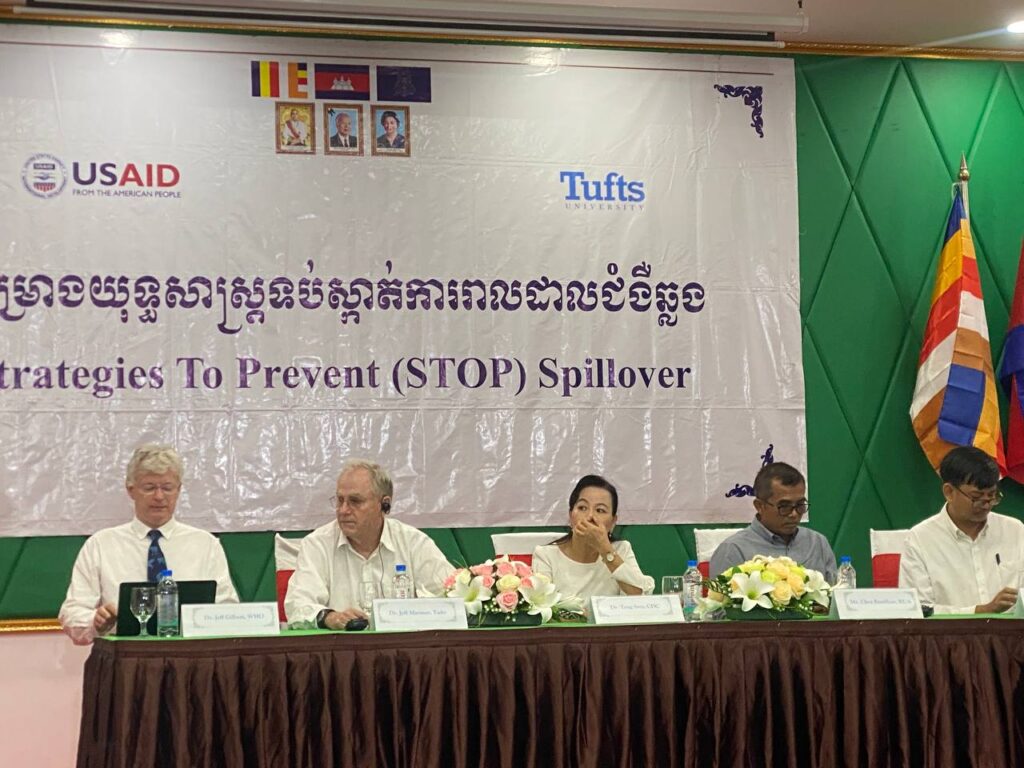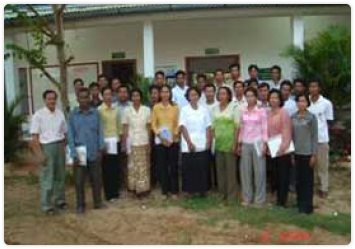Services
- Training courses
- VNHW
- Forage crop
- Pig/chicken and cattle raising
- Cricket farming
- Chaya gardening
- Hosting and organizing: Seminars/Workshops (negotiation)
- Lodging for research and development
- On-farm experiments
- Feed analysis for chemical composition
1. Facilities
– Seminar room (Phnom Penh) = $ US 30/day for 25 persons.
– Seminar room (Kandal) = $ US 20/day for 25-30 Persons.
– Cross-Visit / Study tour = $ US 50/day from 10 Persons. (the charge includes facilitators).
– Training at LDC-CelAgrid (more than 15 Persons):
- $ US 35 / persons / day (include training facilities – LCD, flipcharts, markers, documents, facilitators, accommodation, snacks, meals).
- Note : Training manuals will be an additional charge according to topics.
2. Consultancy:
Junior staff = $ US 25/day/person
Senior staff = $ US 50/day/person
Highly professional staff = $ US 100-150/day/person
3. Available services
– Animal health, nutrition and production including feeding and management (goals, cattle, pigs, and poultry).
– Utilization of local feed resources in animal feeding.
– Production, preservation and utilization of agricultural products and byproducts for animal feeding.
– Improve management, feeding and systems of backyard poultry for the control bird flu and better income
– Renewable energy (biogas and gasification) including installation, maintenance and operation.
– Integrated farming system development and organic farming.
– Community development and extension methodologies and approaches including livestock Farmer Field School.
– Experimental design, data collection and statistical analysis.
– Project assessment (participatory rural approval) design, Monitoring and Evaluation.
- Note: training curriculum and agenda will be made available after discussion and negotiation.
Seminars / Workshops
The “workshop on outbreak risk management”
Date: 13-14 September 2023
Venue: LBN Hotel, Kampong Cham
Organized by Tufts UNIVERSITY
Background
STOP Spillover is a USAID-funded five-year project led by Tufts University and consisting of 14 organizations and experts in human, animal, and environmental health. It is implemented in 7 countries in Asia and Africa. In Cambodia, the project is implemented by Tetra Tech.
The objective of the workshop
● Involving bat-human interface partners and stakeholders to test or exercise outbreak risk management
coordination aspects.
● brief bat-human interface,
● conduct tabletop exercise to revise and improve proposed scenario on outbreak risk management, and
recommend next steps.
Participants
About 40 participants are involved in this workshop. These are include Bat-guano producing households.
non-bat-guano producing, ministries related to one-health, local and international NGOs
Results
– 5 presentations on the zoonotic and how is pathogens transmission from animal to human and how to prevention from this transmission.
– Field visit to bat producing household (observation on how producer collect bat manure, storage and biosecurity etc).
– Group presentation from the field visit
– Risk management on outbreak from bat virus to human
Thank
Dr. Chhay Ty


Picture on 14 September 2023
December 12-13, 2006:
LDC-CelAgrid hold annual workshop in Pursat with the participation of 32 community leaders, commune councils, government of Phnom Kravanh district, LDC-CelAgrid staff and FSIF/CIDA coordinator. The objectives of the annual workshop were: (i) to report and discuss problems and constraints during the implementation of first year project; (ii) to share experiences with new selected communities; and (iii) plan activities for second year. The full report of the annual workshop will be presented separately.
August 22-26, 2006:
LDC-CelAgrid was honored to organize a regional workshop on
Forages for Pigs and Rabbits at the Sunway Hotel in Phnom Penh from August
22-24, 2006 and the MEKARN Steering Committee Meeting and Research Project
Proposal evaluation from August 25-26, 2006.
The
participants were researchers from Cambodia , Vietnam , Laos , Colombia , and
Australia and the workshop was supported by Sida/SAREC through an established
agricultural research network in Mekong Region (MEKARN). More than 50
researchers and development workers such NGOs and government staff attended and
presented their research papers. The proceeding of the workshop will be
published by MEKARN. The objectives of the workshop were:
- Exchange experiences on problems
and solutions in feeding of forages as the major parts of the diets for
pigs and rabbits in the tropics
- Discuss the role of forages as the
components of environmentally friendly integrated farming systems
- Discuss role of the pigs and
rabbits for poverty alleviation in the rural areas.
Topics of the workshop were:
LDC-CelAgrid
was honored to organize a regional workshop on Forages for Pigs and Rabbits at
the Sunway Hotel in Phnom Penh from August 22-24, 2006 and the MEKARN Steering
Committee Meeting and Research Project Proposal evaluation from August 25-26,
2006.
The
participants were researchers from Cambodia , Vietnam , Laos , Colombia , and
Australia and the workshop was supported by Sida/SAREC through an established
agricultural research network in Mekong Region (MEKARN). More than 50 researchers
and development workers such NGOs and government staff attended and presented
their research papers. The proceeding of the workshop will be published by
MEKARN. The objectives of the workshop were:
- Selection and cultivation of
protein-rich forages in different ecological zones
- Feathers of the of the digestive
physiology of pigs and rabbits that related to the use of forages
- Feeding systems for pigs using
forages as the major sources of the protein
- Feeding systems for rabbits using
forages as the major component of the diets
Role of pigs and rabbits and their social importance in the integrated
farming systems.
Training courses
LDC-CelAgrid has been organized several training courses for government, NGOs and project staff from 2003-2006 and the detail of course topics, number of participants and institutions are listed below.
Training courses and demonstration organized by LDC-CelAgrid from 2003-2006
Topic
General
LDC-CelAgrid has been organized several training courses for government, NGOs and project staff from 2003-2006 and the detail of course topics, number of participants and institutions are listed below.
- Research and On-Farm Trial Methodologies
- Community Development Approach and Methodologies
- Monitoring and Evaluation and Report Writing
- Farmer Field School Methodologies and Approach
- Extension Approach and Mathodologies
Technical
- Integrated Farming system methodologies
- Local feed resources for livestock feeding
- Fattening pigs and feed formulation
- Sow and piglets management and feeding
- Hen and chicks management and feeding and diseases control
- Using cassava leave silage for cattle and goat feeding.
- Production, preservation and de-toxicification methods local feed resources such as cassava leaves and roots, soybean grains, small fish and fish trash, sweet potato, taro, water hyacinth, duckweed.
- Earthworms’ production and utilization.
- Renewable energy (biodigester and gasification)√ Protein feed blocks
- Village Animal Health Workers (VAHW)
- Small-scale aquaculture
Training/DEMO Participants
- 480 pilot farmers of 16 villages in Phnom Kravanh district, Pursat province
- 360 pilot farmers of 12 villages in Treang and Kandal Stung districts from Kandal and Takeo provinces
- 15 pilot farmers and staff from Hellen Keller International
- 43 farmer leaders and staff from CEDAC.
- 28 farmer leaders and staff from CCRD.
- 75 government staff under MAFF/APIP/ IFAD/WB project
- 25 staff from ADESS project in four North-Western provinces of Cambodia and staff of CBRDP in Kampot and Kampong Thom.
- 25-30 staff from 16 NGO partners of Heifer International Cambodia annual train at LDC-CelAgrid
- 150 MAFF extension workers from 13 provinces under Cambodian Australian Agriculture Extension Project (CAAEP) and IFAD project.
- 65 farmers in Tramkak, Takeo and Phnom Srouch and Thpong districts, Kampong Speu (EC-SLPP).
- 71 extension workers and ADDA staff in Siem Reap.
1 Aug, 2005- Oct, 2006:
The Cambodian Australian Agricultural Extension Project Phase 2 “CAAEP” with financial support from AUSAID contracted Dr. Khieu Borin on behalf of LDC-CelAgrid as Subject Matter Specialist to train more 150 extension workers in its 13 target provinces in Cambodia . The training was provided linked with the farm demonstration on sow feeding and management and village hen and chicks feeding and management.
2- August, 2006:
CEDAC contracted LDC-CelAgrid to organize training for their staff Small-holder Agricultural Innovation and On-farm Trial aiming at learning techniques of small-holder agriculture innovation, understanding more on-farm experimental design and implementation and understanding to conduct on-farm trials with farmers in term of organization, monitoring, data recording and analysis. It was expected that after the training, participants can apply the knowledge in the target areas where they are implementing the project to help small-holders to alleviate their poverty. A total of 13 CEDAC staff from Kampong Thom province participated in the course.
3- July, 2006:
Training on Protein Feed Block for Ruminant aiming at introducing the protein feed block formulation by American Soybean Association (ASA). It was expected that after the course participants are able to extend the knowledge gained from the course to the target sites where the project is implementing. The course participated by government officers from the Department of Animal Production, Heifer Cambodia and her partners, and private company.
4- June, 2006:
Through the project supported by CIDA financed Food Security Initiative Fund, CelAgrid organized a training for Community Leaders of the target villages of Phnom Kravanh district, Pursat on Community Management, Self Help group, Heifer International – Cambodia Cornerstones model, and bookkeeping. LDC-CelAgrid has implementing food security project in Phnom Kravanh since July 2005 and in each target community a Community Organization was formed and it is therefore important to strengthen the capacity of community leaders to management resources which has been provided through the project. It was expected that after the course, they can manage the target villages more effectively.
5- May-June, 2006:
Refresher training for Village Animal Health Workers was conducted at LDC-CelAgrid with the participation 16 participants. The 16 VAHWs were from the 16 LDC-CelAgrid targeting communities in Phnom Kravanh district, Pursat province. They had the course on animal health such as diseases control and prevention and the Pathogenic Avian Influenza at the Office of Agriculture in Phnom Kravanh and additional training on animal management and feed such as cows, pigs and chickens was organized at LDC-CelAgrid. All participants were accommodated at LDC-CelAgrid.


Village Animal Health Worker Training organized at the Phnom Kravanh Agricultural Office
Training and cross visit for community leaders from Phnom Kravanh, Pursat